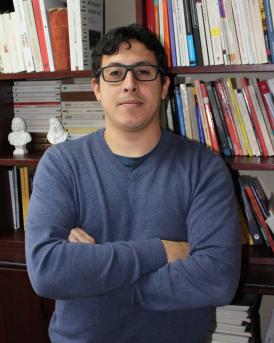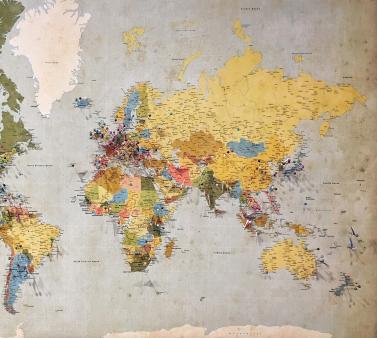
Professor Eduardo Gallegos Krause is a specialist in communication theory, discourse theory, semiotics and critical perspectives on media at the Faculty of Education, Social Sciences and Humanities of the Universidad de La Frontera (UFRO), Temuco, Chile.
How did your collaboration with ERIMIT begin, and with whom do you mainly work?
I work closely with Jimena Obregón Iturra (former Director of the Americas Master's program) and Andrés Castro Roldán, (Co-Director of the Americas Master's program). I met Professor Jimena Obregón Iturra in 2009, when I was a graduate student at Sciences Po Rennes. I went on to do a Master's and a PhD in communications in Chile. As part of this doctorate, I did two research internships, one in the Netherlands, the other here at Rennes 2. So I kept in touch with her throughout my studies. It's at her invitation that I'm here now, as part of the international chair.
What can you tell us about your research and the subject you'll be tackling at the colloquium "Chile, 50 years, 1973-2023. Any changes?"
My research focuses on the mediatization of identities and otherness from a contemporary perspective. I'm particularly interested in the media treatment of social movements, the imaginary world of identities, and the relationship between "us" and "others". I also work extensively on the socio-historical mediations between the press and literature in the 19th century. During the international colloquium this week, I’ll be discussing how there's still an imaginary that sees political adversaries as enemies. This demonization is very much linked to feelings of living with 'communist ghosts'. Many other topics related to this issue will also be examined during the colloquium. Interventions will focus, for example, on social movements, questions of memory, and the arts and cinema in Chile.
Could you tell us more about the changes you mentioned, as far as politics in Chile are concerned?
Have there been any real changes in the last 50 years? I'm not very optimistic. On the contrary, I see continuity... The anti-communist sentiment of 1973 hasn't changed. It's a legacy of the far right, of fear of others, others being the Communists. In the study I carried out, I found that anti-communism is still as present in today's processes as it was in 1973. This can be seen in the media coverage in Chile, in comments on blogs, from readers... The political divide is very important today, the divisions are very strong. I was talking to people who lived through the coup d'état, and many of them told me that the current climate echoed "things that have already happened". The situation in Chile mirrors what is happening elsewhere in Latin America and the United States, with Jair Bolsonaro in Brazil, Donald Trump in the United States and Javier Milei in Argentina. There's a shift to the far right that's very problematic.
What other activities have you planned at Rennes 2 as part of your visit?
I'll be giving two master classes for the Master des Amériques. I'll be talking about the Mapuche movement in Chile, as well as the strategy for raising its profile in the mainstream and alternative press, and the links between Mapuche poets and the press. We'll be doing discourse analysis based on press interviews with Mapuche poets. These classes will be held on October 18 and 19, in Spanish.




